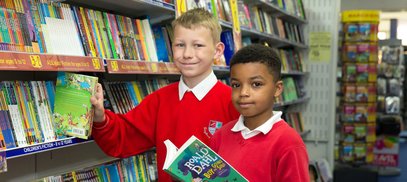In a landscape of over-stretched budgets and with wide ranging barriers to learning to overcome, many schools are struggling to invest the time or money that they want to in their school library. When we spoke to schools about their libraries prior to taking part in the Puffin World of Stories programme, we found common themes ran throughout their experiences:
“Our library was quite rundown, the books were tatty and the children didn't go in there. They didn’t think the library was a friendly space.”
“It was more of kind of a communal dumping zone. You walk into a library and half of the books are probably as old I am. And there's just wasn't that kind of engagement.”
But this was all about to change. Since 2018, The National Literacy Trust has worked with Penguin Random House to improve the libraries of 250 primary schools in disadvantaged communities. Schools received the training and resources to improve their libraries and establishing a culture of reading for pleasure. They also received a selection of 300 exciting and diverse book titles from Puffin and access to an online audiobook library.
On the day of the book delivery – the excitement in participating schools is palpable! The injection of these new titles into the library bring with them a world of opportunities for children to connect with diverse new authors, characters and stories, and the knock-on effects of this are huge:
Before, children didn’t see the value or long-term purpose of reading. They didn’t know that there were books out there that represented them, that they could find themselves in books… there's more of a buzz about reading around the place now. You see kids outside at breaktime reading and it's all starting to filter through - it's changing attitudes.
The impact of the programme has been transformational for the schools involved, who all worked incredibly hard to create positive, inviting library spaces for their children and the lasting impact of their dedication is already clear to see in the reading behaviours and attitudes of the children:
“We take classes into the library, give them free roam. They just sit on the floor, pick up the books, see what they like. It gives them that experience of a normal library outside of school. They sit and chat to each other about the books…[all] the way from nursery to year six, they all go in now, which is a huge change for us.”
“I think now if you were to go around and talk to the kids, they would have a much stronger opinions [about books]. They would be able to say, ‘I like this author… I like this genre of writing’ or tell you about a character that they’ve really empathised with or enjoyed.”
“If I was to ask my class, I think maybe three or four of them have been to a library in their entire life apart from school, and now they see them as a nice place to want to go.”
When we speak to Puffin World of Stories school about their approach to improving the library some themes leap out across them all.
Here are our top five starting points for improving your school library:
- Get children involved – ask them what they want to see in their library and how they want to use it. Give them formal roles, like pupil librarian or reading ambassador and give them regular ways to have their say on what goes on there and how it looks.
- Quality not quantity is key – Whilst it is tempting to keep hold of tired looking copies of books and keep the shelves stuffed, often it can put children off engaging with collection. Where possible, recommend making the most of any School Library Services in your area to keep your library catalogue up to date and enticing.
- Celebrate diversity. Having an appealing range of books in the library, that reflect the rich diversity of the society we live in is key to creating an inclusive reading for pleasure culture.
- Read. Understanding the books in your library as a reader will help you to make tailored recommendations and build the children’s perception of you as a reader. Children love to read something a member of school staff has picked out especially for them.
- Mix it up! Look at the breadth of your catalogue – is there something for everyone? Value magazines, comics, poetry fiction and non-fiction equally – and remember to respond to the children’s ideas about the kind if books they’d like to read.
The last year or so has shown us how important libraries are in supporting disadvantaged communities. Pre-pandemic, National Literacy Trust research showed that 1 in 11 children from disadvantaged communities don’t own a single book and for many of them, the school library is their first point of contact with the life-changing potential of library services, which is one of the many reasons we support Cressida Cowell’s Life Changing Libraries campaign for better school library provision.
Our Primary Library Review – open for contribution until Friday 25 June – has been gathering feedback from schools and librarians on the impact of the Covid-19 pandemic. The emerging themes from our enquiry, which we will publish in the early autumn, echo those of the teachers included in this blog – a quality school library provision can have a profound effect on the lives of the children who access them and it is vital that they are treated as priority in post-pandemic recovery.
Lucy Starbuck Braidley is Programme Manager, Reading for Enjoyment at The National Literacy Trust. She is an experienced primary school teacher, English lead and lover of children’s literature.
Find out more about Puffin World of Stories.
Contribute to our Primary School Library Review.
Schools subscribed to National Literacy Trust membership can access our Foyle Primary School Library Course.
